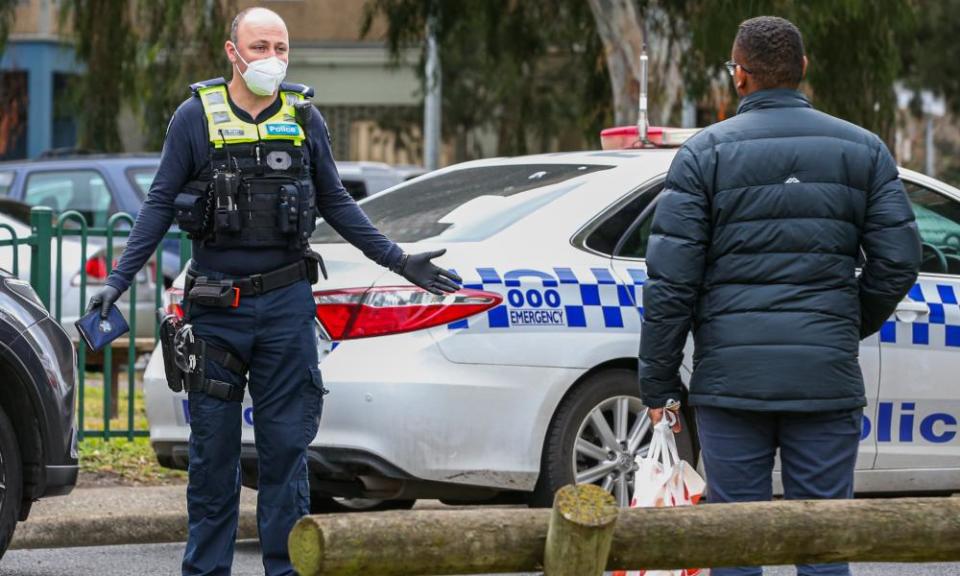Melbourne towers' sudden hard lockdown caught police, health workers and residents off-guard

The Flemington public housing estate had a confused start on Sunday morning as residents, police and workers from the Department of Health and Human Services struggled to come to terms with the implications of premier Daniel Andrews’ shock “hard lockdown” announcement.
At 10am workers from the department were trying to find out what to do to keep the estate’s 3,000 or so residents confined to quarters and supplied with food and necessities for the next week.
Most of the department personnel had been told only on Sunday morning to turn up to work and had had no clear instructions.
The previous afternoon, dozens of police cars and about 500 police officers descended on the estate without warning as Andrews announced the complete lockdown of the public housing estates in Flemington and North Melbourne.
Resident Hiba Shanino said: “Some single mothers who don’t speak much English were asking ‘Why are they here? What have we done wrong?’”
Other residents, returning home, asked if there had been a murder or a drugs raid.
According to residents on the estate, there were no interpreters, no social workers and no medical staff in this first wave of government response. Community leaders had not been informed or consulted. Residents arrived home only to be told they would not be allowed out again.
One mother had left her children with a relative outside the estate, and was allowed by police to do a quick U-turn and go and fetch them.
Other residents arrived with large boxes of groceries, having heard of the lockdown while still outside the estate.
On Sunday, residents’ responses ranged from fear and anger to relief that the health risks on the estate were at last receiving government attention.
Community leaders said they had been trying for weeks to get problems addressed, including a lack of hand sanitiser, inadequate cleaning of shared spaces and, in the case of one tower, a broken lift, which meant the sole remaining lift had to serve 180 flats, many housing up to seven people.
They had been aware of Covid-19 cases in the area, and had been frightened that it would not be possible to stop its spread in the congested living conditions.
Awatif Taha said residents were shocked, but added: “I am also happy, because we were scared the government had forgotten us, and we have been very frightened, and now something is being done about it.”
By mid-morning on Sunday, interpreters and medical workers in personal protective gear had started the process of working from flat to flat, seeking to test every resident on the estate for the Covid-19 virus. Workers in full hazard gear were fumigating the playgrounds on the estate, and taping them off so they could not be used.
Boxes of basic necessities – flour, Weetbix, pasta, juice and tinned tomatoes – were stacked in the foyers of the public housing towers, but there was at first confusion about how to get them to residents – whether they should be allowed to come down in the small elevators to collect them, or whether workers should go up to distribute the supplies.
Adam Bandt, Green MP for the seat of Melbourne, which covers the North Melbourne public housing estate, claimed his office had tried to distribute health and safety information to residents in the flats but had been prevented.
Bandt recorded a video outside the towers and posted it to his Facebook page. In the background, residents could be seen calling out from windows that they had no food.
Residents on the estate were meanwhile texting friends, relatives and their contacts in the wider suburb asking for prescriptions to be filled, food to be delivered and nappies purchased.
Bill Shorten, the federal MP for Maribyrnong, arrived on the estate at 11.20am with local members of the Flemington community, who had compiled shopping lists of needs.
The manager of the Multicultural Sudanese Centre on the estate, Elhadi Abass, said that Shorten had met estate residents, and had promised to take their concerns to the Andrews.
Abass said residents of the estate wanted help, but that it should be being provided by medical and social workers, not by police. “The police don’t even know how to spell coronavirus,” he said.
He hoped that Andrews would listen to the community leaders’ ideas on how to address the crisis, which included local coronavirus testing stations, clearer messaging and a relaxation of the lockdown to put the estate residents on the same footing as their neighbours in the rest of the 3031 postcode.
By late afternoon, some sense of order was being established, with a webinar called of social services involved in the effort, together with representatives of the Flemington Kensington Community Legal Centre and other community groups.
Despite their overwhelming presence, residents reported that police were being sensitive and helpful, and apparently more in touch with what was needed than the Department of Health and Human Services.
Police were heard assuring residents they would try to make sure they had “some degree of normality” in the days ahead. There was talk of making sure pizza could be delivered.
By early evening, residents said “there is more order now” and the boxes of essential supplies were able to be distributed, although some people in Flemington were still taking calls from the housing estate residents asking for shopping to be done.
The lockdown is expected to last at least five days, during which authorities will aim to test every resident.

 Yahoo News
Yahoo News 